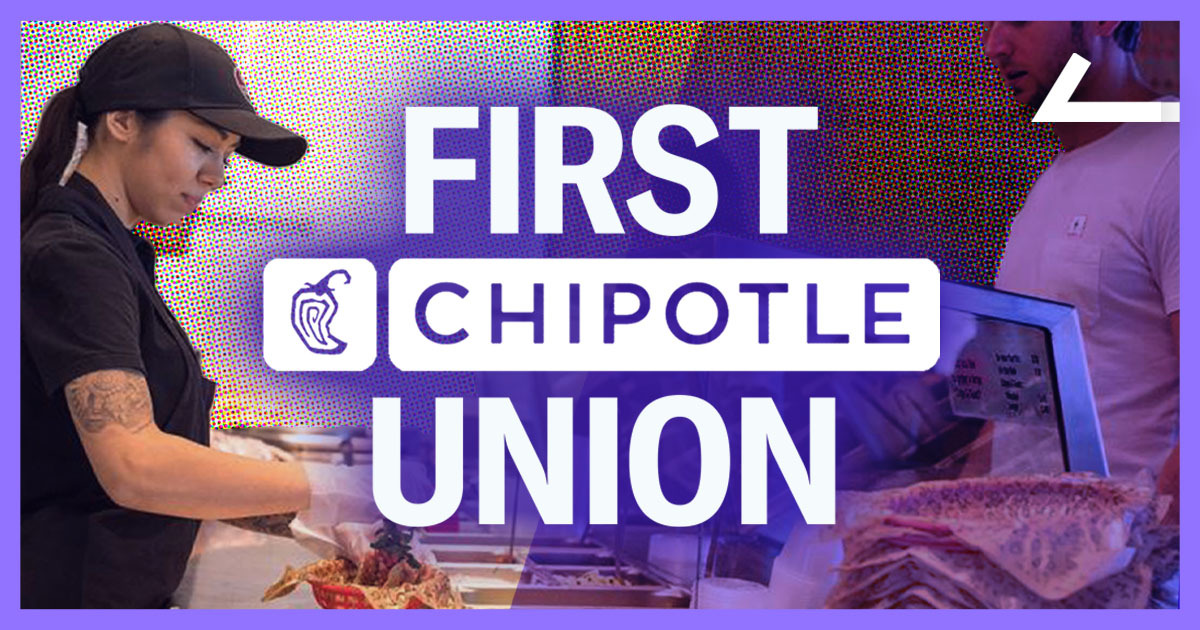Produced and edited by Jordan Zakarin, Paula Pecorella, and Nes Sanchez
Chipotle workers in Maine are forming the company’s first union. They say the store is chronically understaffed leading to injuries & exhaustion. Chipotle made $653 million in profit in 2021. Instead of investing in staff, it spent $100 million on stock buybacks to enrich shareholders. We spoke with the Augusta Chipotle workers. Below is a full transcript of the video.
Brandi: When I walked back into that restaurant in January, after being gone for two years, I wanted to cry. It was an immediate— my heart just dropped. Nothing in that restaurant looked like it had been taken care of, including the crew.
Ethan: I started noticing the issues in Chipotle pretty much right from the bat.
Galen: I started noticing issues pretty much day one. They kept insisting that we run with not quite the number of people that we should run with.
Arrow: If there aren’t enough people to run the store, we have to cut corners.
Brandi: But we have customers coming in and they’re upset. “Why are you so slow? Why is the food not right?” The dangers of not being able to have enough people to run the store are a lot of shortcuts that are unsafe. We had people working injured.
[News clip]: I am interested in companies with magnificent sales and earnings. Like Chipotle.
[News clip]: Chipotle beats on the top and bottom lines for Q1, and same-store sales also up 9%.
[News clip]: Chipotle shares sizzled in early trading Wednesday, jumping more than 10% to a record high.
[Chipotle CEO]: You know look, I think our secret weapon is our people and our culture.
Brandi: The short staffing has led to injuries and exhaustion in the crew.
Ethan: When we’re operating a half crew or even a third of the crew, a lot of the people have to work double time and extra jobs. We end up getting ourselves spread thin, and like a candle burning at both ends it burns out pretty fast
Arrow: Everyone was overworked. Everyone was burnt out. And everyone was doing the job of at least two full people.
Brandi: We had complained in all of the appropriate ways. And it was time for us to say, we can’t keep doing this.
Ethan: If we weren’t going to meet the minimum mandatory amount of people in order to work the job properly and effectively, we weren’t going to open up the shop at all.
Brandi: We weren’t troublemakers. We were just asking to be cared for better
Ethan: Most of it was just them walking in and asking us questions.
Brandi: So far, it’s been a lot of us signing paperwork and acknowledging our responsibilities.
Ethan: But no concrete promises were made.
Brandi: We still don’t have the right training. We just want to be able to function.
Ethan: We’re asking for the bare minimum that chipotle itself should be providing to begin with. Training and staffing your own restaurant is pretty par for the course for any business.
Brandi: It benefits us, but also it benefits Chipotle and the customers, too. When we realized that we could all stand up together and say, “Hey, we’re not gonna do this anymore. You can’t, you know, run us around like this anymore.” They listened. They deployed. We all went, “oh, this is, this is the power of being a collective.”
Arrow: This little tiny Chipotle way in Maine managed to make national news. And hopefully what we did can inspire people from all walks of life and from all sorts of companies to know that if you don’t feel like you’re being treated right by your company, you can do stuff about it. You absolutely have a voice. You absolutely have power and you should use it.
Videography by Daniel Quintanilla



